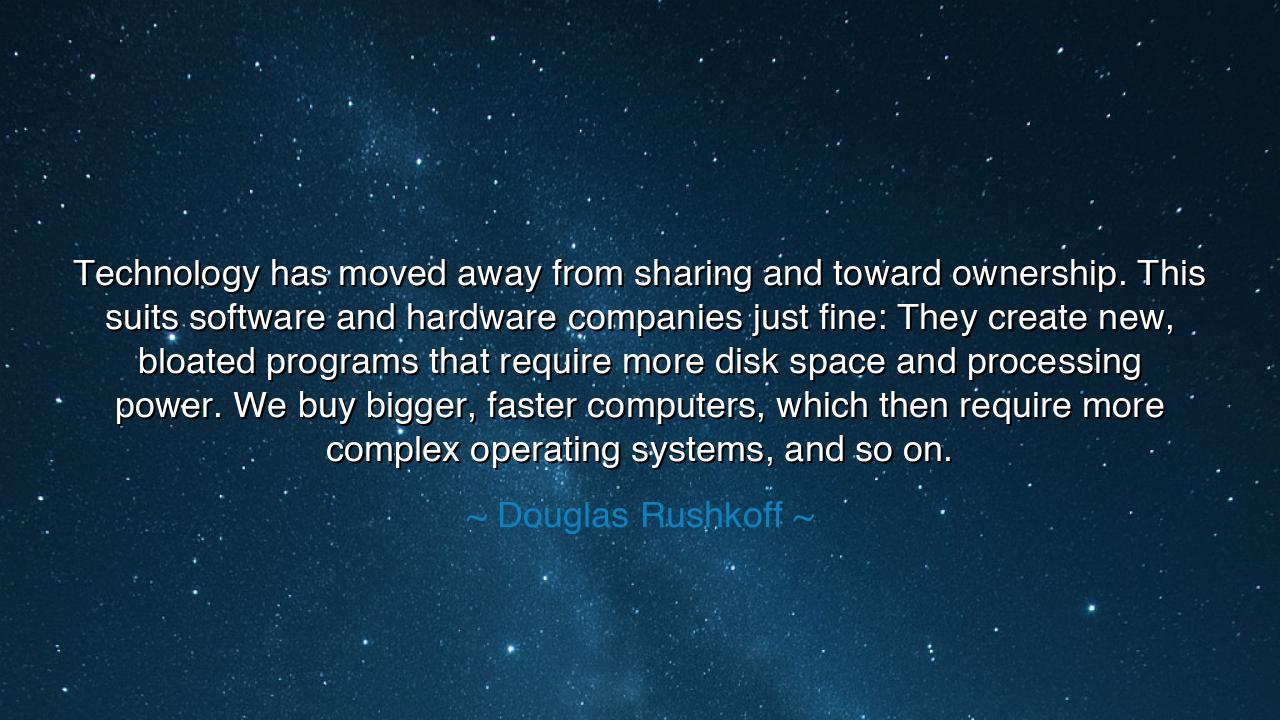
Technology has moved away from sharing and toward ownership. This
Technology has moved away from sharing and toward ownership. This suits software and hardware companies just fine: They create new, bloated programs that require more disk space and processing power. We buy bigger, faster computers, which then require more complex operating systems, and so on.






The modern philosopher and media critic Douglas Rushkoff, a watcher of the tides between man and machine, once warned: “Technology has moved away from sharing and toward ownership. This suits software and hardware companies just fine: They create new, bloated programs that require more disk space and processing power. We buy bigger, faster computers, which then require more complex operating systems, and so on.” Beneath these words lies a profound reflection on the cycle of consumption, the endless loop by which human creativity, once born in the spirit of collaboration, becomes ensnared in the pursuit of profit. Rushkoff speaks not only as a critic of technology, but as a guardian of wisdom—reminding us that the tools we make can either liberate or enslave, depending on the intentions behind their creation and use.
In the earliest dawn of the digital age, technology was born in a spirit of sharing. The pioneers of computing—students, inventors, and dreamers—worked in open rooms, passing ideas like torches between them. The code they wrote was not property but language, meant to be learned, altered, and improved by all. This was the age of collaboration, when information flowed freely and invention was the child of curiosity, not commerce. Yet, as Rushkoff laments, that spirit has waned. The light of sharing dimmed beneath the shadow of ownership, and technology, once a common river, became a series of private wells.
When he speaks of bloated programs and the endless need for faster computers, he describes a cycle as old as greed itself. In the ancient markets of Babylon, merchants learned that if one could create the illusion of need, one could rule the buyer. So too do the empires of modern technology build devices that require newer, larger, and more powerful systems—feeding upon the very hunger they create. Each innovation, instead of freeing the user, binds him to the next. It is a cycle of dependence, cleverly masked as progress. And thus, the human being—once the master of his tools—finds himself serving them instead.
History bears witness to this pattern. In the early 20th century, Henry Ford revolutionized industry with the assembly line, bringing mobility to millions. But over time, what began as liberation became entrapment. The automobile, once a symbol of freedom, created the cities of congestion and pollution that now imprison their inhabitants. The same principle echoes in Rushkoff’s warning: when innovation loses its soul, the tool turns upon its maker. Technology, like fire, must remain servant, not master—or it consumes the very civilization it was meant to advance.
Yet Rushkoff does not speak in despair, but in challenge. For even in this age of digital ownership, the power of sharing endures. The rise of open-source movements, creative commons, and cooperative technologies reveals that the human spirit still longs for connection over control. In the spaces where knowledge is given freely, progress returns to its truest form—collective creation, not corporate consumption. He calls us back to that original vision: a world where technology is a bridge, not a barrier; where ideas are gifts, not possessions.
The lesson, then, is both moral and practical. Resist the endless call to upgrade for its own sake. Ask not how your tools can own you, but how they can serve humanity. Share knowledge instead of hoarding it. Seek simplicity where complexity is sold. Support technologies that empower communities, not corporations. Remember that every great innovation begins not with control, but with curiosity—and that the true progress of civilization lies not in faster machines, but in wiser minds.
So, children of the digital age, take heed of Douglas Rushkoff’s wisdom. The gleaming devices before you are not the measure of your freedom; the measure is how you use them. Do not be dazzled by the speed of the new or the size of the next. Instead, look inward, where true advancement lies. Let your technology reflect your humanity, not replace it. For only when knowledge is shared freely, and creation is guided by conscience, will we restore balance between the machine and the soul—and reclaim the destiny of the builder from the grasp of the merchant.






AAdministratorAdministrator
Welcome, honored guests. Please leave a comment, we will respond soon